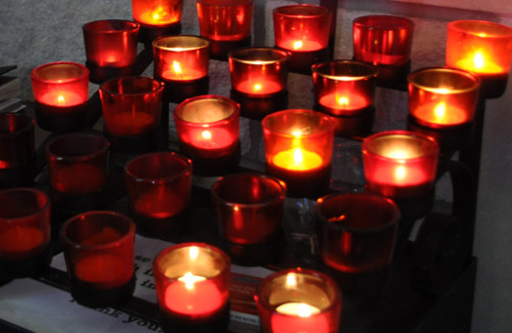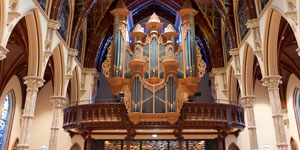Anointing of the Sick
“The Church believes and confesses that among the seven sacraments there is one especially intended to strengthen those who are being tried by illness, the Anointing of the Sick:
This sacred anointing of the sick was instituted by Christ our Lord as a true and proper sacrament of the New Testament. It is alluded to indeed by Mark, but is recommended to the faithful and promulgated by James the apostle and brother of the Lord” (¶ 1511 Catechism of the Catholic Church).
“The Anointing of the Sick ‘is not a sacrament for those only who are at the point of death. Hence, as soon as anyone of the faithful begins to be in danger of death from sickness or old age, the fitting time for him to receive this sacrament has certainly already arrived.’ If a sick person who received this anointing recovers his health, he can in the case of another grave illness receive this sacrament again. If during the same illness the person’s condition becomes more serious, the sacrament may be repeated. It is fitting to receive the Anointing of the Sick just prior to a serious operation. The same holds for the elderly whose frailty becomes more pronounced” (¶¶ 1514-1515 Catechism of the Catholic Church).
“The first grace of this sacrament is one of strengthening, peace and courage to overcome the difficulties that go with the condition of serious illness or the frailty of old age. This grace is a gift of the Holy Spirit, who renews trust and faith in God and strengthens against the temptations of the evil one, the temptation to discouragement and anguish in the face of death. This assistance from the Lord by the power of his Spirit is meant to lead the sick person to healing of the soul, but also of the body if such is God’s will. Furthermore, ‘if he has committed sins, he will be forgiven’”(¶ 1520 Catechism of the Catholic Church).
“By the grace of this sacrament the sick person receives the strength and the gift of uniting himself more closely to Christ’s Passion: in a certain way he is consecrated to bear fruit by configuration to the Savior’s redemptive Passion” (¶ 1521 Catechism of the Catholic Church).
“By celebrating this sacrament the Church, in the communion of saints, intercedes for the benefit of the sick person, and he, for his part, though the grace of this sacrament, contributes to the sanctification of the Church and to the good of all men for whom the Church suffers and offers herself through Christ to God the Father” (¶ 1522 Catechism of the Catholic Church).
“If the sacrament of anointing of the sick is given to all who suffer from serious illness and infirmity, even more rightly is it given to those at the point of departing this life; so it is also called sacramentum exeuntium (the sacrament of those departing). The Anointing of the Sick completes our conformity to the death and Resurrection of Christ, just as Baptism began it. It completes the holy anointing that marks the whole Christian life: that of Baptism which sealed the new life in us, and that of Confirmation which strengthened us for the combat of this life. This last anointing fortifies the end of our earthly life like a solid rampart for the final struggles before entering the Father’s house” (¶ 1523 Catechism of the Catholic Church).
If you or someone in your household needs the Sacrament at another time, phone (312) 787-8040 to talk with one of our priests. Please pray for the sick.
Communion for the Sick and Homebound
The policy at Holy Name Cathedral for the Eucharist to be carried to a sick or homebound parishioner is as follows: Hosts are not to be obtained during the distribution of Holy Communion but could be picked up by a Minister of Care after Mass or at an appointed time. If you wish to have a Minister of Care visit, please contact the Rectory at (312) 787-8040. Thank you for your cooperation.


